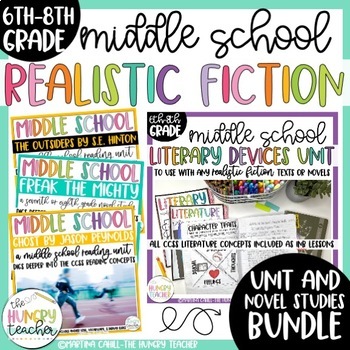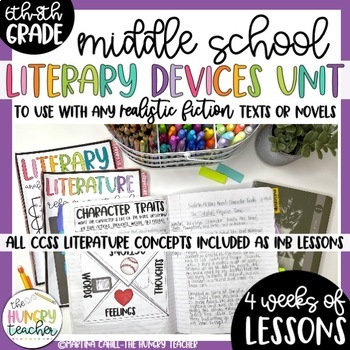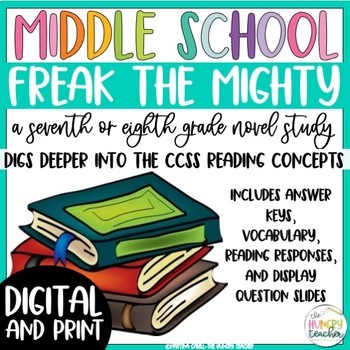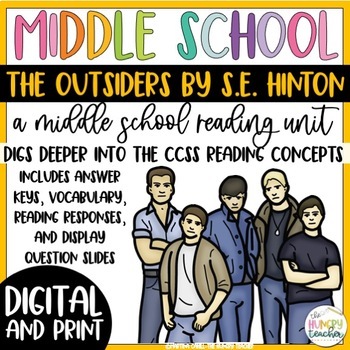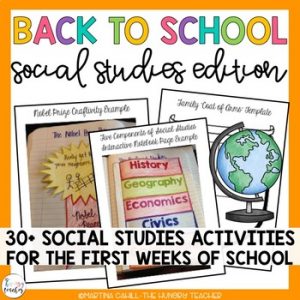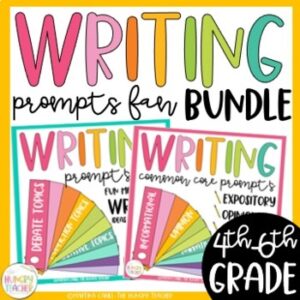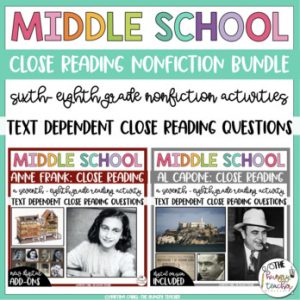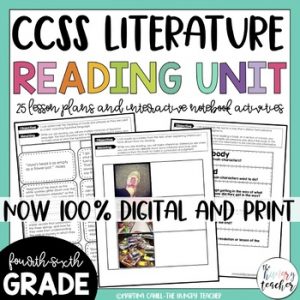Description
Download a preview <<HERE>>
-
Realistic Fiction and Literature Unit: 18 Lesson Plans and Resources
-
Daily Lesson Plan pacing guides, prep breakdown, and mentor text information
-
15 different daily lesson plan slide presentations to accompany each interactive notebook lesson.
-
Digital realistic fiction reading response student notebooks
-
Digital Google Slides version of student interactive notebook lessons
-
Editable and digital literature reading response grading rubrics
-
Book Club formation forms, resources, book suggestions, and more!
-
BONUS: Starbooks book tasting resource to form book clubs
-
50+ different examples of reading responses differentiated by grade: Examples are labeled by text and not grade level so you can mix and match or choose your own texts.
-
Sixth- Ghost by Jason Reynolds
-
Seventh- Freak the Mighty by Rodman Philbrick
-
Eighth-The Outsiders by S.E. Hinton
-
Pre-Lesson 1: Starbooks Realistic Fiction Novel Selection/Book Club Selections
-
Pre-Lesson 2: Hard and Fast Figurative Language and Literature Terms
-
Lesson One: Realistic Fiction Novels Point of View Impact
-
Lesson Two: Realistic Fiction Novels Setting Impact
-
Lesson Three: Realistic Fiction Novels Analyzing Character Traits
-
Lesson Four: Realistic Fiction Novels Direct and Indirect Characterization
-
Lesson Five: Realistic Fiction Novels Analyzing Theme
-
Lesson Six: Realistic Fiction Novels Literary Inferences
-
Lesson Seven: Realistic Fiction Novels Literary Conflict
-
Lesson Eight: Realistic Fiction Novels Point of View vs. Perspective
-
Lesson Nine: Realistic Fiction Novels Literary Text Structures
-
Lesson Ten: Realistic Fiction Novels Inspiration from the Past
-
Lesson Eleven: Realistic Fiction Novels Elements of Plot
-
Lesson Twelve: Realistic Fiction Novels Figurative Language Analysis
-
Lesson Thirteen: Realistic Fiction Novels Theme Development
-
Lesson Fourteen: Realistic Fiction Novels Central Idea and Objective Summary
-
Lesson Fifteen: Realistic Fiction Novels Multimedia Versions Analysis
-
Lesson Sixteen: Realistic Fiction Novels Narrative Point of View
-
CCSS Learning Standards for 6th, 7th, and 8th
-
Learning Target for Lesson
-
Guiding Questions for Reading Responses
-
Interpretive Question for Book Club Discussions
-
Vocabulary
-
Teacher Preparation (though all my examples can be used)
-
Literature Interactive Notebook Lesson and Examples/Answer Keys
-
Learning Period: Lesson, Read Aloud, and Modeling
-
Reading Response Break Down
-
Reading Response Display Slides to show students an example for each lesson.
-
Different Reading Response Example for each grade with Unique Mentor Texts.
-
Graphic organizer reading response options for all lessons
-
Book Club Assignment
-
Three Different Examples for All Reading Responses (6th- Ghost by Jason Reynolds; 7th- Freak the Mighty by Rodman Philbrick, and 8th- The Outsiders by S.E. Hinton).
-
Links to videos that teach or introduce each literature concept.
-
Reading Response Slides to Be Displayed While Students are Reading and Writing
-
Book Club Slides to Be Displayed During Book Club Meetings
-
Graphic Organizers for all Reading Responses
-
Literature Terms and Figurative Language Reference Notebook
-
Literature Circle Forms, Implementation Resources, and Group Grading and Forms.
-
Literature Editable Reading Response Rubrics
-
Ghost 19 Lesson Reading Unit
-
Freak the Mighty 16 Lesson Reading Unit
-
The Outsiders 16 Lesson Reading Unit
-
Teacher answer keys and vocabulary for all lessons.
-
32+ Reading Response Examples for teachers and students to reference.
-
12+ Literary Devices Mini-Anchor Charts or Student Reference Pages
-
15+ Reading Response Graphic Organizers
-
40+ page Implementation Teachers Guide: Socratic Seminar, Tips and Tricks, Pacing, Student Examples, FAQs, scripted lesson examples, etc.
-
PowerPoint, JPEG, and PDF Display slides for all Guiding and Interpretive Questions
-
Digital Student Reading Response Notebooks
-
Editable PowerPoint Reading Response Rubrics: Differentiated by grade level.
-
Editable PowerPoint Literary Nonfiction Reading Response Rubrics: Differentiated by grade level.
-
Small group and individual conference teacher forms
-
Pre-Lesson: Socratic Seminar Norms
-
The Outsiders Day 1: Point of View
-
The Outsiders Day 2: Plot
-
The Outsiders Day 3: Central Idea
-
The Outsiders Day 4: Characterization
-
The Outsiders Day 5: Text and Poem Structure
-
The Outsiders Day 6: Narrative Point of View
-
The Outsiders Day 7: Theme
-
The Outsiders Day 8: Theme
-
The Outsiders Day 9: Characterization + Plot
-
The Outsiders Day 10: Narrative Point of View
-
The Outsiders Day 11: Characterization + Plot
-
The Outsiders Day 12: Author’s Purpose
-
The Outsiders Day 13: Movie Comparison
-
Bonus Lesson One: Comparing Texts
-
Bonus Lesson Two: Objective Summaries
-
Pre-Lesson: Socratic Seminar Norms
-
Freak the Mighty Day 1: Point of View
-
Freak the Mighty Day 2: Plot
-
Freak the Mighty Day 3: Character Traits
-
Freak the Mighty Day 4: Characterization
-
Freak the Mighty Day 5: Text Structures
-
Freak the Mighty Day 6: Literary Conflict
-
Freak the Mighty Day 7: Theme
-
Freak the Mighty Day 8: Narrative Point of View
-
Freak the Mighty Day 9: Characterization
-
Freak the Mighty Day 10: Author’s Purpose + Theme
-
Freak the Mighty Day 11: Author’s Purpose + Irony
-
Freak the Mighty Day 12: Point of View + Theme
-
Freak the Mighty Day 13: Movie Comparison
-
Bonus Lesson One: Comparing Texts
-
Bonus Lesson Two: Objective Summaries
-
Pre-Lesson: Socratic Seminar Norms
-
Ghost Day 1: Point of View
-
Ghost Day 2: Author’s Purpose
-
Ghost Day 3: Plot
-
Ghost Day 4: Text Structure + Theme
-
Ghost Day 5: Theme
-
Ghost Day 6: Theme
-
Ghost Day 7: Character Traits
-
Ghost Day 8: Plot
-
Ghost Day 9: Point of View
-
Ghost Day 10: Plot + Inferences
-
Ghost Day 11: Character Traits
-
Ghost Day 12: Characterization
-
Ghost Day 13: Narrative Point of View
-
Ghost Day 14: Theme + Characterization
-
Ghost Day 15: Theme + Plot
-
Bonus Lesson 1: Audio Comparison
-
Bonus Lesson 2: Comparing Texts
-
Bonus Lesson 3: Objective Summaries
